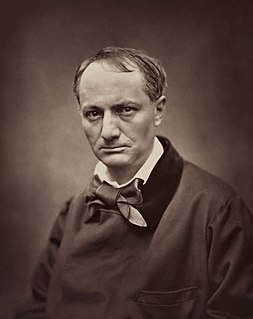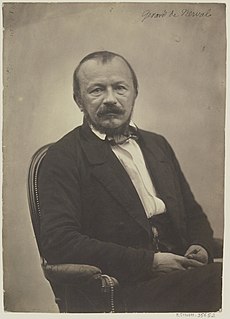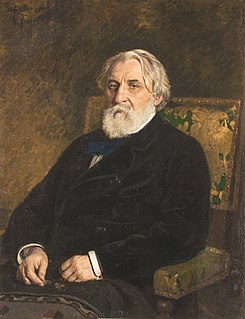
Charles Pierre Baudelaire was a French poet who also produced notable work as an essayist and art critic. His poems exhibit mastery in the handling of rhyme and rhythm, contain an exoticism inherited from Romantics, but are based on observations of real life.

Honoré de Balzac was a French novelist and playwright. The novel sequence La Comédie humaine, which presents a panorama of post-Napoleonic French life, is generally viewed as his magnum opus.

Pierre Jules Théophile Gautier was a French poet, dramatist, novelist, journalist, and art and literary critic.

Gérard de Nerval was the pen name of the French writer, poet, and translator Gérard Labrunie, a major figure of French romanticism, best known for his novellas and poems, especially the collection Les Filles du feu, which included the novella Sylvie and the poem "El Desdichado". Through his translations, Nerval played a major role in introducing French readers to the works of German Romantic authors, including Klopstock, Schiller, Bürger and Goethe. His later work merged poetry and journalism in a fictional context and influenced Marcel Proust. His last novella, Aurélia, influenced André Breton and Surrealism.

Ivan Sergeyevich Turgenev (; Russian: Ива́н Серге́евич Турге́нев, IPA: [ɪˈvan sʲɪrˈɡʲe ɪvʲɪtɕ tʊrˈɡʲenʲɪf]; 9 November 1818 – 3 September 1883 was a Russian novelist, short story writer, poet, playwright, translator and popularizer of Russian literature in the West.
This article contains information about the literary events and publications of 1883.
This article contains information about the literary events and publications of 1852.
This article contains information about the literary events and publications of 1850.
This article contains information about the literary events and publications of 1836.

George Edward Bateman Saintsbury, FBA, was an English critic, literary historian, editor, teacher, and wine connoisseur. He is regarded as a highly influential critic of the late 19th and early 20th century.

Catulle Mendès was a French poet and man of letters.

Charles Paul de Kock was a French novelist. Although one of the most popular writers of his day in terms of book sales, he acquired a literary reputation for low-brow output in poor taste. In 2021 Brad Bigelow wrote : "Today, if we set aside over-priced print on demand reprints of his ancient editions, the works of Paul de Kock haven't seen a new English edition in at least a century."

19th-century French literature concerns the developments in French literature during a dynamic period in French history that saw the rise of Democracy and the fitful end of Monarchy and Empire. The period covered spans the following political regimes: Napoleon Bonaparte's Consulate (1799–1804) and Empire (1804–1814), the Restoration under Louis XVIII and Charles X (1814–1830), the July Monarchy under Louis Philippe d'Orléans (1830–1848), the Second Republic (1848–1852), the Second Empire under Napoleon III (1852–1871), and the first decades of the Third Republic (1871–1940).

Illusions perdues — in English, Lost Illusions — is a serial novel written by the French writer Honoré de Balzac between 1837 and 1843. It consists of three parts, starting in provincial France, thereafter moving to Paris, and finally returning to the provinces. The book resembles another of Balzac's greatest novels, La Rabouilleuse, that is set in Paris and in the provinces. It forms part of the Scènes de la vie de province in La Comédie humaine.
Partial Portraits is a book of literary criticism by Henry James published in 1888. The book collected essays that James had written over the preceding decade, mostly on English and American writers. But the book also offered treatments of Alphonse Daudet, Guy de Maupassant and Ivan Turgenev. Perhaps the most important essay was The Art of Fiction, James' plea for the widest possible freedom in content and technique in narrative fiction.

Notes on Novelists is a book of literary criticism by Henry James published in 1914. The book collected essays that James had written over the preceding two decades on French, Italian, English and American writers. The book also contained a controversial essay, The New Novel, 1914, which passed judgment on various contemporary writers and occasioned much disagreement.

Mammonart. An Essay on Economic Interpretation is a book of literary criticism from a Socialist point of view of the traditional "great authors" of Western and American literature. Mammonart was written by the prolific muckraking journalist, novelist and Socialist activist Upton Sinclair, and published in 1925.
The Symbolist Movement in Literature, first published in 1899, and with additional material in 1919, is a work by Arthur Symons largely credited with bringing French Symbolism to the attention of Anglo-American literary circles. Its first two editions were vital influences on W. B. Yeats and T. S. Eliot—a note that, for nothing else, would assure its historical place with the most important early Modernist criticism. Richard Ellmann has contributed an Introduction to most modern editions.
For centuries Paris has been the home and frequently the subject matter of the most important novelists, poets, and playwrights in French literature, including Moliere, Voltaire, Balzac, Victor Hugo and Zola and Proust. Paris also was home to major expatriate writers from around the world, including Henry James, Ivan Turgenev, Oscar Wilde, Ernest Hemingway, James Joyce, Leopold Senghor, James Baldwin, Richard Wright, Milan Kundera and Henry Miller. Few of the writers of Paris were actually born in Paris; they were attracted to the city first because of its university, then because it was the center of the French publishing industry, home of the major French newspapers and journals, of its important literary salons, and the company of the other writers, poets, and artists.

Algernon Charles Swinburne was an English poet, playwright, novelist, and critic. He wrote several novels and collections of poetry such as Poems and Ballads, and contributed to the famous Eleventh Edition of the Encyclopædia Britannica.













